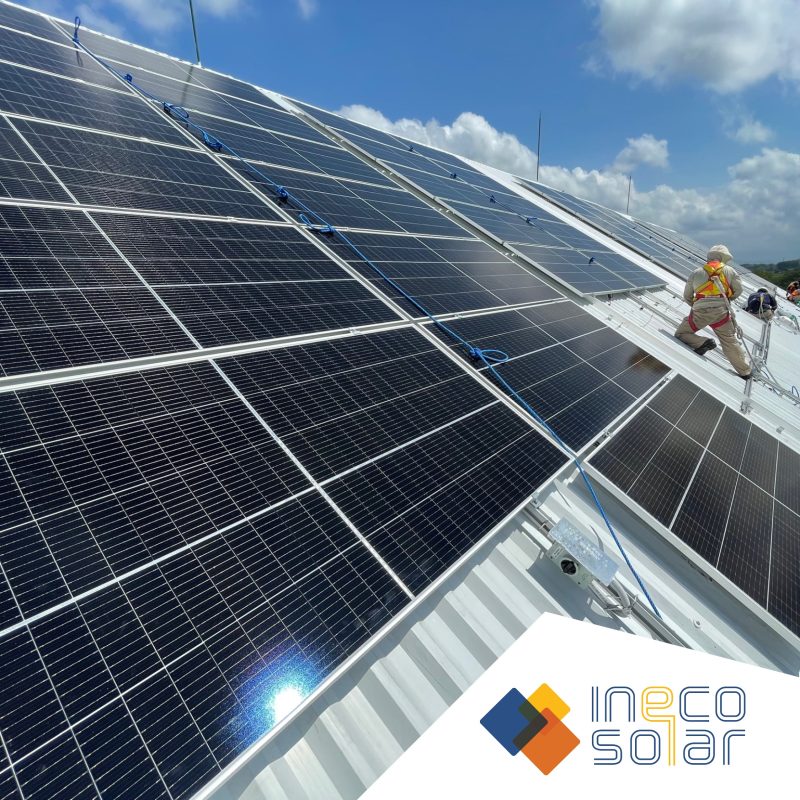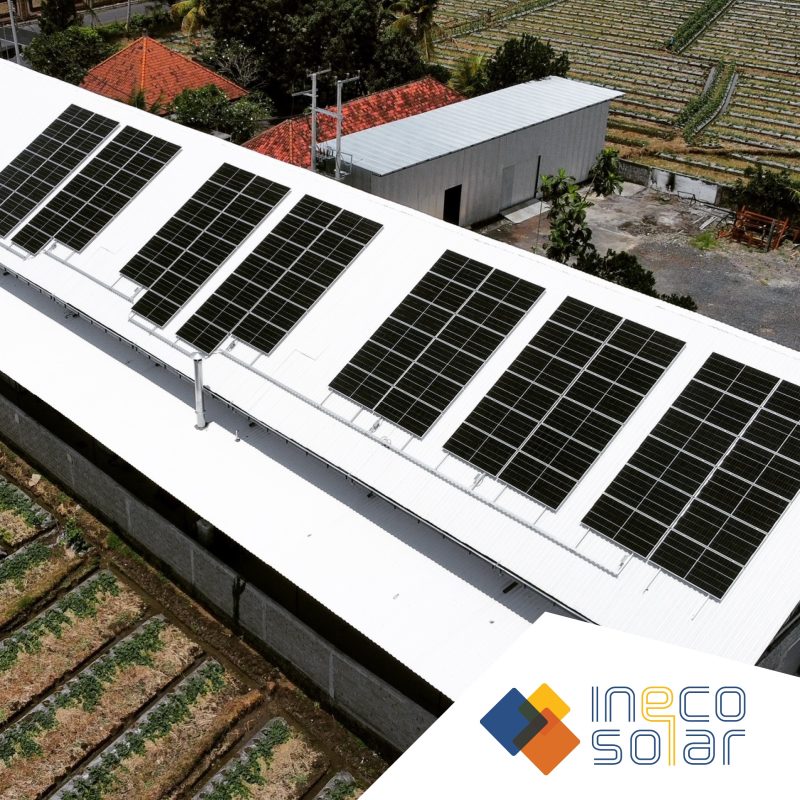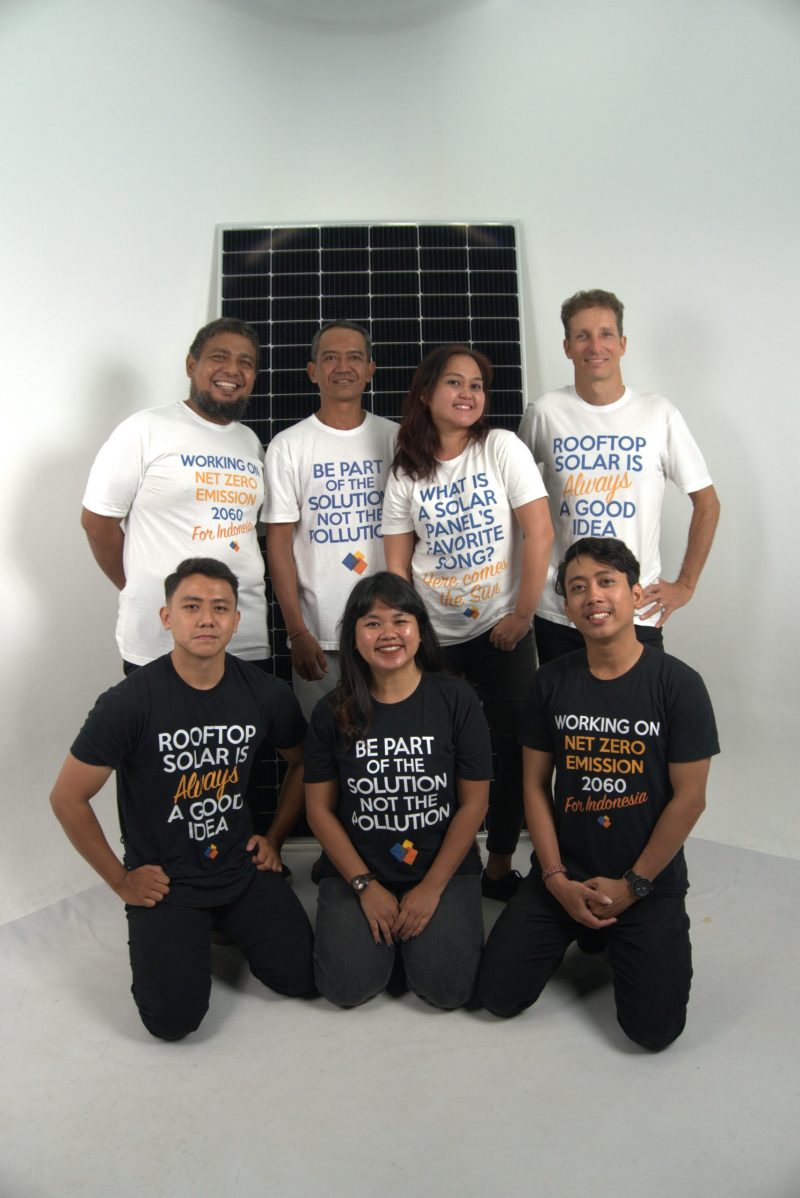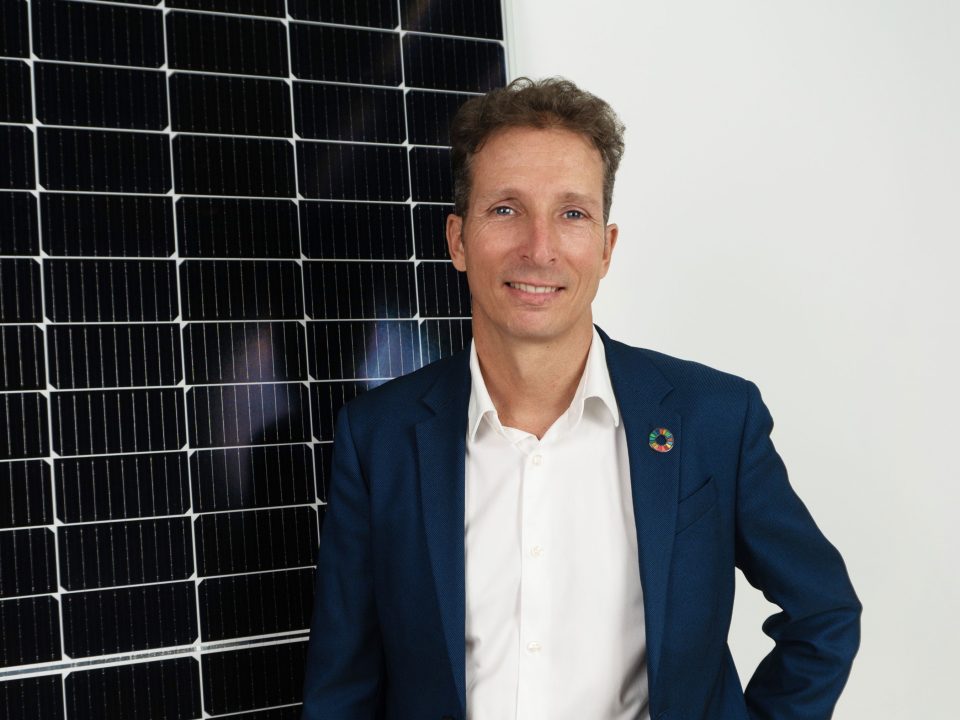“Growing up in the south of France embedded two passions that will forever stick with me: surfing and windsurfing. The latter shaped my career, the former took me around the world,” said Benoît Prim, Founder and Director of Inecosolar.
“For those who’ve had a chance to experience windsurfing, it’s one of the most exciting and beautiful sports – going fast on the water, riding and jumping waves, seeing the ocean from a different angle, all powered by the wind – are all amazing sensations; so much so that one becomes obsessed with weather forecasts, wind mechanics, and finding the best spot to go windsurfing in any given condition.
“Could you imagine doing all this research for a living? This is what happened to me when I started a job as a wind engineer for Electricité de France, the French electricity utility, 20 years ago to design wind farms when wind power was starting to take off – getting paid to find wind. This is how my career in renewable energy started; I found something I really loved doing. The expression ‘Do what you love, love what you do’ couldn’t fit me better.”
Hi Benoît! We’d like to know more about you.
Hi, I’m Benoît Prim, 47 years young, originally from France but also adopted by Australia where I lived for more than ten years before moving to the Philippines and then to Indonesia. I’ve been living in Bali for six years and came to work on the first utility-scale wind farm built in Indonesia.
My passion for windsurfing took me to wind farms; wind farms took me to Bali and solar panels; Bali took me to start a rooftop solar business and help everyone be part of the solution in the everyday ever-more-present climate change issue.
Being French, my wife Venezuelan, and our kids Australians, we also are every immigration agent’s nightmare, especially when we moved from the Philippines to Indonesia.
What are your thoughts on expat life in Bali? Do you have a renewable energy dream you wish to attain in Bali?
I’m quite lucky to enjoy such a great lifestyle among the locals who are one of the nicest people I’ve ever met. Put it this way; my wife got pregnant only a month after we arrived in Bali, this surely has to do with the Bali effect!
It’s not always easy to understand the culture at first and can sometimes be frustrating, but once we learned to go with the flow, just like with the motorbike on the road, we can really appreciate what Bali has to offer and it’s unique.
I’d like to put solar panels on as many buildings as possible: every roof is an opportunity and there is so much sun in Bali, it feels like it’s almost a waste not to use it. Now I’m also aware that access to funding for most of the locals is a huge obstacle but this is why we are starting to offer financing options for solar installations.
Briefly tell us about Inecosolar.
Inecosolar was founded in 2018. Being involved in large-scale solar projects, I could see the price of solar panels dropping quickly – ~90 percent in less than 10 years! – making it a financially viable alternative to grid electricity, of which 88 percent comes from fossil fuel in Indonesia. However, while I have negotiated some solar projects for some clients in the past, I’ve never installed any by myself! I went to Australia to get training on how to design and install rooftop solar systems complying with Australian standards. This is what we’ve been applying since day one and has always been well received by our customers.
We recently went through a restructuring and our new investor, Yinson Renewables, brings along the required funding to offer a zero upfront cost solar solution to our commercial and industrial customers. They can now lower their electricity bills and carbon footprint without spending any money – we pay for it and offer them a discount on the PLN tariff. We trust our customers will see this as a pretty good deal. We need to enter into an equipment lease agreement for 15-25 years. We’d then hand over the solar system to them so they can enjoy substantial savings for another five or ten years or more.
Our unique specificity is that we do everything in-house: development, financing, construction, and operation. We cut the middlemen and offer better savings to our customers.
Inecosolar has the philosophy: Every electron counts. Elaborate on this, please.
An electron is the primary carrier of electricity. Where does it come from? As I said earlier, 88 percent of the electricity generated in Indonesia comes from fossil fuels: coal, oil, and gas. Fossil fuel burning amounts to 75 percent of greenhouse gas emissions and 90 percent of CO2 emissions which are both directly responsible for climate change.
It’s critical to reduce the use of fossil fuels in our generation mix. Indonesia is at the forefront of the climate change effect which is already being felt through the early rainy season, higher flood intensity levels, etc. It’s only going to get worse if nothing is done to tackle the issue at the source: fuel consumption.
The good news is that renewable energies have made tremendous progress and the cost of wind and solar electricity is competitive with fossil fuel generation. Solar panels are the easiest and cheapest way to lower carbon emissions because their cost has dropped significantly, their efficiency has improved, and they are very modular, thus it’s easy to adjust to a project’s needs. This is why rooftop solar is booming all around the world; it’s a proven and bankable technology which delivers on its promises.
Run through the Inecosolar process for first-time customers.
We’ll ask for some basic information: where is the building located, how much do they pay per month on electricity bills, what are their operating days and hours? We also ask for a roof drawing and an electrical set-up drawing.
Based on these, we can do a desktop analysis; design a solar panel layout and use PVSyst, the industry-leading and most bankable simulation software, to assess how many kWh the solar project will generate. This will allow us to estimate the discount we can offer on the PLN tariff e.g. 15 percent or more, how long or short the lease agreement should last, and how much savings the customer can expect during and after the lease period, both in rupiah and CO2 emissions.
Once we agree on what the customer prefers (shorter lease term or higher discount), we ask PLN to confirm what capacity can be installed. At the same time, we do some energy monitoring to understand how and when the customer is consuming energy. When all technical matters are clarified, we can enter into an equipment lease agreement and start the construction of the project.
Once approved by PLN and commissioned, we operate the project and get paid on the kWh generated by the solar system, so if the system doesn’t perform, we don’t get paid! It’s in our best interests to deliver a performing project. At the end of the lease term, we hand over the system to the client who can fully benefit from the savings from the solar system. Solar panels have a performance warranty of at least 25 years but it doesn’t mean they will stop working after that, it’s just that the manufacturer will not be liable for the performance reduction beyond that period.
For residential customers or those wanting to pay upfront for the solar system, the initial process is the same but we just design, procure, and build the system. The customer finances and operates it.
Would you mind sharing a current project Inecosolar is working on?
Yes, we are working on several projects at the moment, one is for a private villa in Nusa Lembongan which will mainly be used for rental purposes. The client wants to brand his property as green as possible and has asked us to maximise the number of solar panels we can put on the roof considering the specificities of the villa. We ended up putting panels on two different parts of the roof. He will use solar generation to reduce its electricity import from the grid, fill the batteries of the electric golf cars and scooters available for the guests, and fill a battery backup storage to provide electricity in case of a blackout.
Another project we’re working on is for an international hotel group operating in Bali, Lombok, and Jakarta. We’re at the proposal stage with this customer and hope to get it started as soon as possible. Again, this client not only wants to reduce its electricity bills but also reduce its carbon footprint and meet the environmental, social, and governance (ESG) targets that investors now require.
These two projects are interesting because both have the same objectives and consider solar panels as not only a way to reduce their electricity bill but also as a marketing tool to add value to their services and reach out to new clients.
I always ask our customers:
- Do you think saving on electricity costs will make your company more competitive?
- Do you believe a lower carbon footprint will add value to your products or services?
- Would a zero upfront solution help you achieve these goals?
If so, we can surely help.
What is the general importance of solar energy? What about in Indonesia?
The total capacity of solar power in the world is one terawatt (TW) which is one million megawatts (MW) and is equivalent to 14 times the total installed capacity of Indonesia (74,532 MW). Solar generation increased by 22 percent in 2021 compared to 2020, however, it only represents 3.6 percent of global energy generation. In Indonesia, solar represents, take a deep breath, 0.3 percent of the total installed capacity or 190MW in 2021. Why? Because Indonesia is relying excessively on coal power generation and going against the trend of most G20 countries which are seeing the benefit of renewable energies from both a financial and energy independence side.
How do you view Indonesia’s renewable energy policies? Is it heading in the right direction? What do you foresee in the future?
The Indonesian government has good intentions to accelerate the energy transition toward renewables in Indonesia. The energy transition is the third topic on the agenda of the G20 summit in November in Bali and the recent energy crisis in Europe highlights the importance of energy independence, which solar and renewables can help with.
There’s a supporting regulation for rooftop solar allowing net metering – meaning, exporting the extra generation to the grid if any, and getting an offset on the electricity – and a Presidential Decree supporting renewable energy development. However, if PLN doesn’t agree to sign the power purchase agreements (PPAs) required for solar or wind farm projects to get built or don’t apply the regulation in place, renewable energies cannot be deployed or take off.
Indonesia has a great potential for renewables and accounts for one-fourth of Southeast Asia’s economy so it’s to its own benefit to harvest cheap and clean energy. Countries like Vietnam or the Philippines, for instance, have embraced solar and renewable energy for good reasons. I and other renewable energy enthusiasts are hopeful the Indonesian government will get the various stakeholders to sing the same tune, so to speak. Right now, its actions sound a bit uncoordinated and the net zero target by 2060 lacks ambition. The International Energy Agency (IEA) believes that much greater policy ambition and efforts by developing countries to reach the net zero target by 2050 are needed if we want to stand a chance to turn climate change around!
Complete this sentence: The biggest hurdle in Indonesia’s renewable energy sector is…
PLN and the coal industry’s vested interests are present at the highest levels of the government. There’s a very educational documentary available on YouTube called Sexy Killers done by Watchdoc which explains in detail the implications between the people in power and their interest in the coal mining and/or power-producing businesses.
It’s astonishing and can be depressing at the same time: no one in power has any real interest in changing Indonesia’s heavy reliance on coal. Why change? It’s a very good business for those involved but comes at a heavy cost for Indonesians: safety for people living near the mine sites, health for people living near coal power plants, and climate change at large. Burning coal is only going to worsen the climate change issue and while most countries are trying to get rid of it, Indonesia dives even deeper into it with the construction of 13 GW by 2026 – equivalent to the production of 39 million solar panels! – which creates an oversupply in the Java-Bali grid and just means Indonesia doesn’t need more power plants, especially renewable energy. Thus, there’s been no new wind farm built since 2017 and solar plants are extremely rare.
The other key element is the coal-fired power plant deals are Take-or-Pay PPAs, which means PLN has to pay for the electricity generated whether it is consumed or not. PLN doesn’t have any interest in energy efficiency or rooftop solar because they see these are a demand reduction and they want more demand, otherwise, it will lose money and doesn’t look good. While the whole world is working toward energy consumption reduction and efficiency, Indonesia is going in the opposite direction because of some unfavourable deals benefitting a few at the top. We’re hopeful that the G20 summit will bring forward changes to the right direction and want to work hand-in-hand with PLN and the government to make the energy transition in Indonesia a reality.
Is there a correlation between renewable energy and preserving the history, culture, and entertainment of Indonesia?
Definitively: renewable energies do not affect the environment and local population the same way coal mining or fossil fuel electricity generation does. In the Philippines, wind farms are becoming a tourist attraction and an education tool where students can learn about renewable energy.
Bali is promoting green tourism and targets quality tourists rather than quantity. Renewable energy can help achieve this goal and be used as a marketing tool. Who doesn’t like an eco-friendly destination? Balinese people have been using wind to fly their kites during the dry season for years so they are well aware of the power of the wind. Also, solar power is used all over Indonesia to dry rice crops. The Indonesian people already use renewable energies, there are just new technologies available now to turn these into electricity at a more affordable price.
What’s next for Inecosolar?
We want to install as many solar panels as possible and make the renewable energy target set by the Indonesian government a reality. We’re targeting customers anywhere in Indonesia with a sizable roof and electricity consumption so we can offer our zero upfront cost solution. I guess I’ll be travelling a lot to meet clients, assessing their sites, and delivering projects as I am also very involved in the construction of the projects.
How can our readers get in touch with you and Inecosolar?
The best way to contact me is to send me an email at [email protected] or contact me on LinkedIn. You can also contact us through our website Inecosolar.com or send an email to [email protected]. On social media, we’re most active on LinkedIn and Instagram. If you happen to be in Bali, please come and see us in our new office in Pererenan, the coffee shop next door does great coffee!




